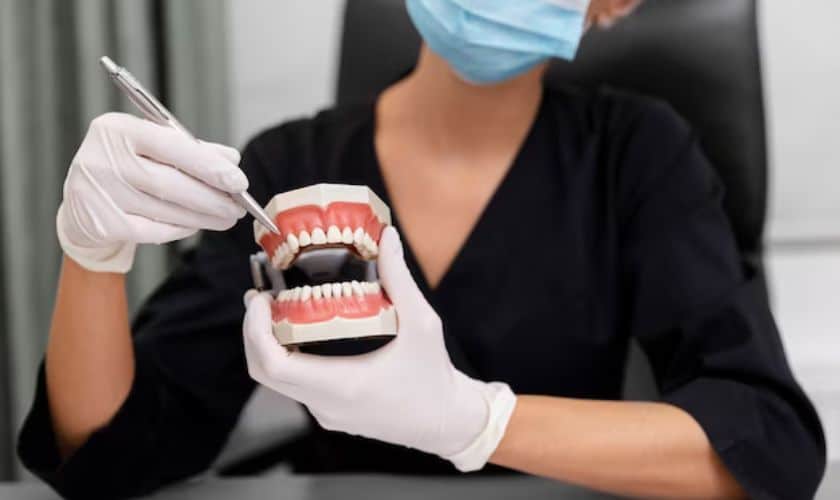(707) 622-6748
Everything You Need To Know About Dentures and Partial Dentures: A Complete Guide

Dentures and partial dentures are dental prosthetic devices designed to replace missing teeth. They are a common solution for people who have lost their natural teeth due to various reasons, such as decay, gum disease, or injury. This guide will provide you with comprehensive information about dentures and partial dentures, including their types, benefits, care, and other important considerations.
Types of Dentures:
- Complete Dentures:
- Complete dentures are used when all of a person’s natural teeth are missing in either the upper or lower jaw.
- They consist of a full set of artificial teeth attached to an acrylic or metal base, designed to fit the shape of the gums and palate.
- Partial Dentures:
- When some natural teeth are gone, partial dentures are utilised. They fill in the gaps while preserving the remaining natural teeth.
- Partial dentures are typically made of a metal or acrylic framework with attached artificial teeth.
Benefits Of Dentures:
- Improved Appearance: Dentures can restore your smile, giving you a more youthful and natural look.
- Enhanced Speech: Missing teeth can affect speech. Dentures can assist you in speaking more effectively.
- Better Chewing and Digestion: Dentures enable you to chew food properly, which can improve digestion.
- Increased Confidence: Dentures can boost your self-esteem by giving you a more appealing smile.
- Support for Facial Muscles: Dentures can help maintain the shape of your face by supporting the underlying facial muscles.
The Process Of Getting Dentures:
- Consultation: Visit a dentist for an examination and consultation to determine if dentures are the right solution for you.
- Impressions: Your dentist will take impressions and measurements of your mouth to create custom dentures that fit comfortably.
- Fitting: Once the dentures are ready, you’ll have several fittings to ensure they fit properly and comfortably.
- Adjustments: Dentures may require adjustments as your mouth adapts to them.
- Maintenance: Regular check-ups are essential to maintain the health of your mouth and the functionality of your dentures.
Caring For Dentures:
Proper care and maintenance are crucial for the longevity and effectiveness of your dentures:
- Cleaning: Rinse your dentures after eating and brush them daily with a soft brush. Use a denture cleaner recommended by your dentist.
- Soaking: Dentures should be soaked in a denture solution overnight to keep them moist.
- Handling: Handle dentures with care, as they can break easily. Always clean them over a soft surface to prevent damage if dropped.
- Oral Care: Don’t forget to clean your gums, tongue, and palate. Brush any remaining natural teeth.
- Regular Check-ups: Visit your dentist regularly for adjustments and oral health check-ups.
Common Issues With Dentures:
- Sore Spots: Dentures may cause sore spots on your gums, which can be resolved through adjustments.
- Slippage: Dentures can slip or move while eating or speaking. Denture adhesives can help with this issue.
- Chewing Difficulties: Initially, it may be challenging to eat with dentures. Start with soft foods and gradually transition to a regular diet.
- Oral Hygiene: Maintaining good oral hygiene is important, even with dentures, to prevent gum and mouth issues.
- Denture Repairs: Dentures can break or wear down over time. Your dentist can make necessary repairs.
Dentures are a reliable solution for tooth loss, but they require proper care and maintenance to ensure their longevity and effectiveness. If you have missing teeth, consult with a dentist to determine the best denture option for your needs and to get guidance on how to maintain them for a healthy and confident smile.

